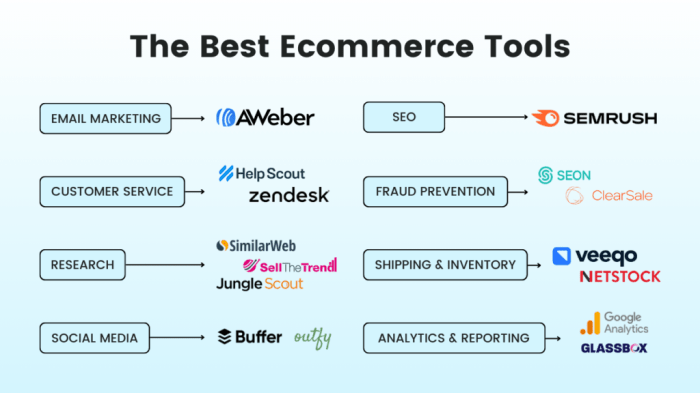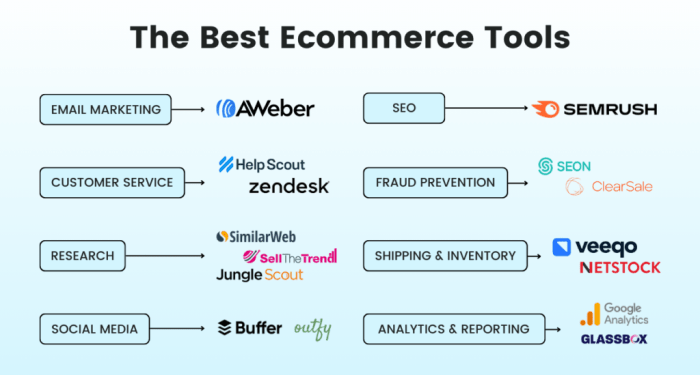In the world of ecommerce, efficiency and growth are key. Dive into the realm of automation and discover how it can revolutionize your operations. From saving time to reducing errors, the right tools can take your business to new heights.
Learn about the latest trends and strategies that can propel your ecommerce business forward with the best automation tools at your disposal.
Importance of Automation in Ecommerce
Automation plays a crucial role in streamlining operations within the ecommerce industry. By leveraging technology to handle repetitive tasks and processes, businesses can save time, reduce errors, and improve overall efficiency.
Key Areas of Automation in Ecommerce
- Order Processing: Automation can help in automatically processing orders, tracking shipments, and sending out notifications to customers, reducing manual intervention and ensuring timely deliveries.
- Inventory Management: By automating inventory tracking, businesses can maintain accurate stock levels, prevent stockouts, and streamline the replenishment process.
- Customer Support: Chatbots and automated responses can enhance customer support by providing instant answers to common queries and resolving issues efficiently.
- Marketing Campaigns: Automation tools can schedule and send targeted marketing emails, personalize communication with customers, and analyze campaign performance for better results.
Essential Automation Tools for Ecommerce

Automation tools play a crucial role in helping ecommerce businesses streamline their operations, improve efficiency, and ultimately, drive growth. Let’s explore some popular automation tools used by ecommerce businesses and how they can benefit your online store.
Order Processing
Order processing automation tools are essential for managing and fulfilling orders efficiently. Here are some popular tools in this category:
- Shopify Flow: This tool allows you to create automated workflows for order processing, such as sending order confirmation emails or updating order statuses.
- Zapier: Zapier enables you to connect different apps and automate repetitive tasks, including order processing, without any coding skills.
- ShipStation: ShipStation automates shipping and fulfillment processes, helping you save time and reduce errors in order processing.
Inventory Management
Efficient inventory management is crucial for ecommerce businesses to avoid stockouts and overstock situations. Here are some automation tools for inventory management:
- TradeGecko: TradeGecko offers inventory management features like automated stock level updates, demand forecasting, and order management to streamline your operations.
- SkuVault: SkuVault helps you track inventory levels in real-time, automate reorder points, and manage multiple warehouses effectively.
- Cin7: Cin7 provides automation tools for inventory control, order management, and warehouse optimization to ensure seamless operations.
Customer Communication
Automation tools for customer communication help ecommerce businesses engage with customers effectively and provide personalized experiences. Here are some tools in this category:
- Klaviyo: Klaviyo offers automation features for email marketing, segmentation, and personalized communication to help you build strong customer relationships.
- Zendesk: Zendesk’s automation tools enable you to streamline customer support processes, manage inquiries efficiently, and provide timely responses to customers.
- Chatbot Platforms: Chatbot platforms like ManyChat or Chatfuel help automate customer interactions, provide instant responses, and enhance customer service on your ecommerce website.
Leveraging AI for Ecommerce Automation
Artificial intelligence (AI) plays a crucial role in automating various aspects of ecommerce, enabling businesses to streamline operations, enhance customer experiences, and drive growth. One of the key areas where AI excels is in personalized marketing campaigns, as it can analyze vast amounts of data to tailor messaging and offers to individual customers.
AI-Powered Personalized Marketing Campaigns
AI algorithms can analyze customer behavior, preferences, and purchase history to create highly targeted marketing campaigns. By understanding each customer’s unique needs and preferences, businesses can deliver relevant content, product recommendations, and promotions, increasing engagement and conversions.
AI-Powered Chatbots for Customer Service
AI-powered chatbots are revolutionizing customer service in ecommerce by providing instant support and assistance to customers 24/7. These chatbots can handle common inquiries, provide personalized recommendations, and even process orders, improving customer satisfaction and reducing response times.
AI Tools for Pricing Strategies and Product Recommendations
AI tools can optimize pricing strategies by analyzing market trends, competitor pricing, and customer demand in real-time. By dynamically adjusting prices based on these insights, businesses can maximize profits and stay competitive. Additionally, AI-powered product recommendation engines can suggest relevant products to customers based on their browsing history and purchase behavior, increasing cross-selling and upselling opportunities.
Strategies for Growth Using Ecommerce Tools
Utilizing ecommerce tools is essential for businesses looking to expand their market reach and drive growth. These tools offer a wide range of benefits that can help increase sales and conversions while freeing up time for strategic planning and business development.
The Benefits of Using Ecommerce Tools for Expanding Market Reach
When it comes to expanding market reach, ecommerce tools play a crucial role in helping businesses reach a wider audience and target new markets. Some key benefits include:
- Increased visibility online through optimized product listings and targeted marketing strategies.
- Access to valuable data and analytics that can help businesses understand customer behavior and preferences.
- Improved customer experience through personalized recommendations and streamlined checkout processes.
- Enhanced brand reputation and trust through consistent and professional online presence.
Share Tips on Selecting the Best Tools to Drive Sales and Increase Conversions
Choosing the right ecommerce tools is crucial for driving sales and increasing conversions. Here are some tips to help businesses select the best tools:
- Identify specific business goals and needs to determine which tools will be most beneficial.
- Consider scalability and flexibility to ensure the tools can grow with the business.
- Look for user-friendly interfaces and seamless integrations with existing systems.
- Read reviews and seek recommendations from other businesses in the industry.
Elaborate on How Automation Can Free Up Time for Strategic Planning and Business Development
Automation plays a key role in freeing up time for strategic planning and business development by streamlining repetitive tasks and improving efficiency. By automating processes such as inventory management, order processing, and customer service, businesses can focus on growth opportunities and long-term strategies.
This allows for more time to analyze data, innovate products, and develop marketing campaigns to drive business growth.
Final Summary
As we conclude our exploration of ecommerce tools for automation and growth, remember that success is within reach. By harnessing the power of automation and strategic planning, your business can thrive in the competitive ecommerce landscape.
Questions Often Asked
How can automation improve efficiency in ecommerce?
Automation can streamline repetitive tasks like order processing and inventory management, allowing businesses to operate more smoothly and effectively.
What are some popular automation tools used in ecommerce?
Popular tools include Shopify Flow, Zapier, and Klaviyo, each offering unique features to enhance different aspects of ecommerce operations.
How can AI tools optimize pricing strategies in ecommerce?
AI tools analyze data to set competitive prices, maximize profits, and offer personalized pricing options to customers, ultimately boosting sales and revenue.



